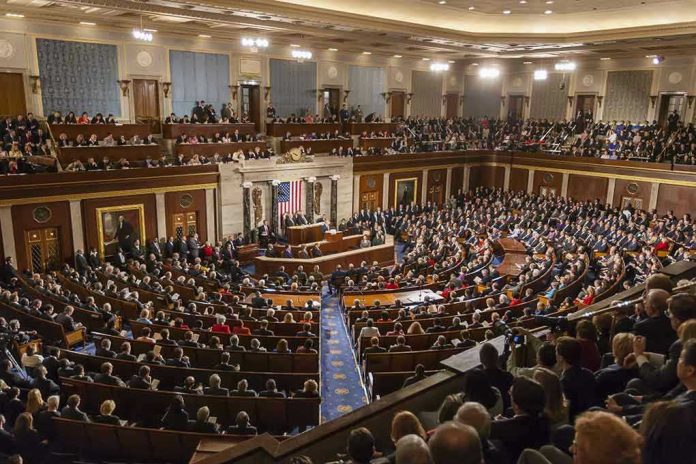
When the president picks up the phone to block a congressional vote on one of America’s most notorious scandals, the question isn’t just about what’s hidden—it’s about who holds the power to keep it that way.
Story Snapshot
- Donald Trump directly summons Rep. Lauren Boebert and House GOP allies to block a vote on revealing Epstein-related documents.
- The move exposes the enduring, hands-on influence of Trump over Republican lawmakers, even out of office.
- The battle over the Epstein vote amplifies public demand for transparency versus party loyalty and political risk.
- What happens in this standoff sets a new precedent for ex-presidential intervention in legislative affairs.
Trump’s Direct Intervention Stalls Congressional Transparency
Donald Trump, no stranger to dominating headlines, has again thrust himself into the legislative crosshairs. Early November 2025, as Congress prepared to vote on whether to release further documents related to Jeffrey Epstein—a case entwined with elite names and national suspicion—Trump acted. He personally reached out to Rep. Lauren Boebert and other House GOP members, urging them to rally against the measure. The result: the vote, which had bipartisan public interest, was delayed and mired in procedural hurdles as Republican resistance mounted under Trump’s direction.
Lauren Boebert, a vocal Trump ally and a figure synonymous with the party’s hardline wing, became the public face of the opposition. In a statement, she framed the vote as “politically motivated,” echoing Trump’s refrain that Democrats aimed to exploit tragedy for “witch hunts.” House GOP leadership, caught between Trump’s demands and institutional responsibilities, faced a classic dilemma—prioritize loyalty to the president or heed rising public calls for transparency in the Epstein case.
Epstein Files: A Scandal That Won’t Die
Jeffrey Epstein’s name has become cultural shorthand for the intersection of privilege, secrecy, and suspicion. Since his 2019 arrest on sex trafficking charges and subsequent death, which authorities ruled a suicide, public appetite for answers has only grown. Congress has repeatedly debated whether to unseal documents that could implicate high-profile figures or reveal government failures. In 2024, new court revelations reignited those demands, leading to the current vote—now stalled by Trump’s intervention and GOP hardliners.
For those tracking the saga, this is more than political theater. Victims and their advocates see every delay as another affront to justice. Major news outlets and social media amplify every twist, asking: why block transparency, and what are lawmakers afraid might come out? The tension between exposing the truth and protecting political or personal reputations has never been sharper.
Trump’s Grip on the GOP—and the Consequences
The Trump-Boebert alliance is more than a political footnote; it’s a sign of how presidents can still steer the party ship. Trump’s public and private lobbying efforts, documented by outlets like The New York Times and Politico, demonstrate that his endorsement remains critical for many Republican lawmakers. Boebert, acting as Trump’s surrogate, seized the moment to galvanize the party’s base and cement her standing within the GOP’s populist wing.
But this maneuvering has costs. The GOP caucus is visibly divided, with some members voicing concern over blocking transparency and the potential erosion of public trust. Democrats frame the episode as a battle for government accountability, warning that blocking the Epstein vote sets a dangerous precedent for congressional oversight. Ethics experts and legal scholars caution that such interventions risk politicizing criminal investigations and undermining the independence of legislative decision-making.
Public Cynicism and the Road Ahead
The standoff over the Epstein vote has immediate and lasting implications. In the short term, partisan tensions spike and the measure’s fate hangs uncertain, while national media coverage intensifies public scrutiny. Long term, this episode could erode faith in Congress and set a new bar for ex-presidential intervention in active legislation. For victims awaiting justice, another delay compounds years of frustration. For the broader public, the spectacle feeds a growing sense of cynicism about elite accountability and the willingness of lawmakers to serve the national interest above political expediency.
Trump Summons Lauren Boebert as He Pushes GOP to Block Epstein Vote – The New York Times https://t.co/F2qdO4QYDc
— Denise🇺🇲 (@Denise10231976) November 13, 2025
What comes next will test not only the mettle of Congress but the balance of power between public demand for answers and the institutional pull of loyalty and self-protection. As the story unfolds, the lesson is clear: in American politics, the fight for transparency is never just about documents—it’s about who controls their destiny, and why.
Sources:
The New York Times, “Trump Presses GOP to Block Epstein Vote,” Nov 2025.
Politico, “Boebert Leads GOP Push Against Epstein Resolution,” Nov 2025.
AP News, “House Delays Epstein Vote Amid GOP Resistance,” Nov 2025.
Brookings Institution, “Trump’s Post-Presidency Influence,” 2025.



